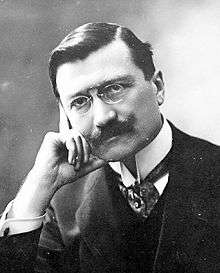Sylvio Lazzari

Sylvio Lazzari (born Josef Fortunat Silvester Lazzari)[1] (Bolzano, December 30, 1857 - Suresnes, June 10, 1944) was a French composer of Austrian origin.
Life
Lazzari came to Paris in 1882 after studying law in Austria. At the Paris Conservatory, he studied under Ernest Guiraud and Charles Gounod. Encouraged by Ernest Chausson and César Franck, Lazzari settled permanently in France and obtained French citizenship in 1896. He held several official positions in Paris, including president of the Wagner Society (from 1894) and choirmaster at the Opéra de Monte-Carlo.
Lazzari's use of cyclic structures was indebted to Franck; he was also heavily influenced by Wagner (especially in his operas) and the impressionists. Very few of his compositions have been performed since his death, but some of his chamber music is occasionally revived.
Works
Symphonic
- Marche pour une fête joyeuse (1903)
- Effet de Nuit ("Fact of Night", Symphonic Tableau after Paul Verlaine) (1904)
- Symphony in E-flat (1907)[1]
- Suite in F major, op.23 (1922)
- Faust (incidental music, Goethe) (1925)
Concertos
- Concertstück, op.18, piano and orchestra, (1887), (1894)
- Rapsodie for violin and orchestra (1922)
Salon Orchestra
- Perdu en mer (1926)
- Escualdune (visions basques) (1927)
- Fête bretonne (1927)
- La chanson du moulin (1928)
- Cortège nocturne (1929)
Chamber music
- String Quartet, op.17a (1887-8)[2][3]
- Piano Trio, op.13 (1889)
- Octet, op.20, for flute, oboe, clarinet, English horn, 2 bassoons, 2 horns (1889)
- Violin Sonata, op.24(1894)
- Barcarolle for cello and piano(1912)
- Scherzo for violin and piano (1931)
Piano
- Valse brilliante, op.4 (1884)
- Valses caractéristiques (1886–8)
- Suite, op.14 (1891)
- 3 pièces, op.16 (1892)
- 2 miniatures (1895)
- Petite esquisse (1903)
- Rapsodie hongroise, 4 hands (1903)
- Romanzetta (1923)
- Cordace (Danse grecque)(1925)
Orchestral Songs
- 2 poèmes (M. Dumont, P. Verlaine), op.30 (1901) (S. Mallarmé, 1903)
- Le cavalier d'Olmedo (after L. de Vega) (1918)
- Le nouveau Christ (H. Bataille) (1918), Baritone
- La fontaine de pitié (Bataille) (1920)
Songs
- More than 50 songs, among other:
- Vieux motif (L.B.) (1884)
- L’amour d'après Ninette (G. Richard) (1887)
- A l'absente (P. Verlaine, J. Lahor, anon.), 6 songs (1892)
- L’oiseau; Au printemps; La jeune fille et la rose (Lazzari), 4 voices (1893)
- 3 mélodies (P. Verlaine, L. Bowitsch, L. Benedite), op.19 (1894)
- L’automne (A. de Lamartine), 3 voices, piano ad lib (1894)
- 3 duos (Lazzari), op.21, Soprano, Baritone (1894)
- 2 poèmes (M. Dumont, P. Verlaine), op.30 (1901)
- 3 poésies d'E. Blémont d'après H. Heine (1906)
- Le cavalier d'Olmedo (after L. de Vega) (1918)
- Le nouveau Christ (H. Bataille) (1918)
- La fontaine de pitié (Bataille) (1920)
Operas
- Armor (1896)
- La Lépreuse (composed 1899, premiered 1912)
- Le Sauteriot (1918)
- La Tour de feu (1928)
References
- 1 2 "Biography of Lazzari". Naxos Records. Retrieved 2007-12-14.
- ↑ Hefling, Nineteenth-century Chamber Music at Google Books, p. 307.
- ↑ Stowell, Cambridge companion to Chamber Music at Google Books, p. 252.
- Don Randel, The Harvard Biographical Dictionary of Music. Harvard, 1996, p. 489.